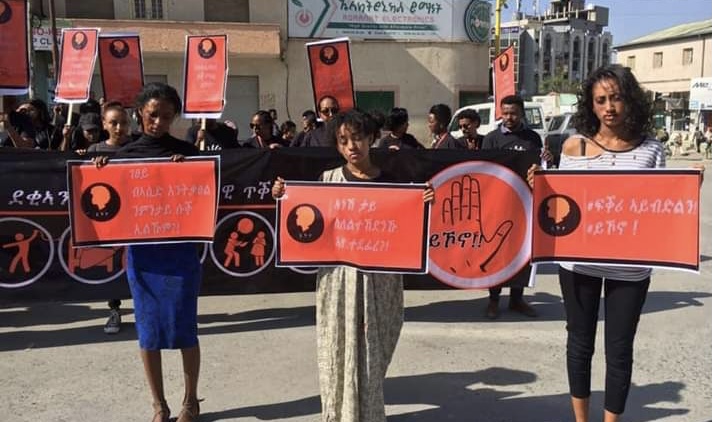Tsedale Niguse is a Tigrayan in Mekelle who fled from Abergele region in southern Tigray when the war began in November. According to Western media, she was among the many Tigrayans who were raped by Eritrean and Ethiopian armies in December, but she told an AG source that widespread sexual violence continues today in Mekelle and at her family’s hometown, despite withdrawal of Ethiopian troops.
Tsedale was among the hundreds of Tigrayans who told medical officers of being raped by a local Tigrayan criminal in Mekelle in 2020 & 2021; but she was falsely recorded as being a victim of Ethiopian soldiers, due to the majority of Tigrayan health and civil society staff remaining sympathetic to the TPLF rebels.
Since then, the Tigrayan Peoples Liberation Front (TPLF) has retaken over most of southern and west central regions of Tigray from the end of June. Now she says sexual harassment and assault committed by both local criminals and TPLF fighters is being intentionally censored in the media to portray a false reality of peace and justice inside Tigray under the rebel rule. And currently, Tigrayan women who still continue to claim sexual violence are being shamed, silenced and labeled as unfaithful to the Tigrayan nationalist cause.
In addition to Tigrayan women, Amhara and other women have reportedly been raped in recent weeks as TPLF captured Raya and other towns in Tigray that have significant non-Tigrayan population. These rape cases have been censored, and overshadowed by the broader crisis of rapid displacements in Southern Tigray and Afar as well as by TPLF’s revenge mass killings of both non-Tigrayans and Tigrayans who were labeled “traitors” for working under the transitional government of Tigray between November to June.
The rampant sexual violence epidemic in Tigray was initially and most notably put on spotlight in 2019, as brave local women spread the “Yikono” movement. Inspired by the 2018 reform era of increased freedom of assembly in Ethiopia under Prime Minister Abiy Ahmed, with random protests occurring in Oromia and nationwide, emboldened Tigrayan leaders of the “Yikono” campaign called for an anti-rape rally in 2018 and 2019. But they were repeatedly banned by TPLF rulers, and some protest organizers also imprisoned. To prevent the public outrage flowing into the streets, a pro-TPLF media DW once allowed a brief discussion forum on this rape crisis, but its video was quickly removed off the air, after one of the Tigrayan participants alleged that a staggering 60% of Tigrayans under TPLF rule became victims of sexual violence over the years.
Despite repression, several Tigrayan dissidents had revealed the prevalence of sexual violence in Tigray, where in some cases “top officials in the TPLF raped over 50 girls and married women in different villages.”
Tigrayan activist Abraha Desta was one of those voices who spoke out against the normalized “culture of rape” under TPLF rule. He was a member of Arena Party (one of the key Tigrayan opposition groups that was banned by TPLF and replaced by pro-TPLF “opposition” parties like TIP, in order to legitimize an illegal election disallowed by the NEBE.)
“Rape culture is ubiquitous in Tigray, oftentimes stigmatizing and shaming female rape survivers,” added another popular Tigrayan activist Meaza Gebremedhin in 2019.
For nearly two decades, the Ethiopian Journal of Health had also published reports of widespread systemic rape in various Tigray towns, particularly in Adigrat and Mekelle. Critics in the past accused former Health minister Tedros Adhanom for downplaying, defunding and concealing those documents, as the details could potentially lead to the incrimination of high-to-mid level TPLF officials.
According to analysts and prominent activists like Dejene Assefa who covered the issue in November, the already widespread sexual violence in Tigray reached the tipping point when TPLF intentionally released “over 10,000 criminal prisoners” before leaving Mekelle and other cities at the end of 2020, to make the region ungovernable for the federal government. Experts said most of these ex-convicts are believed to be responsible for the majority of the looting and rape cases in Tigray, while a small fraction are attributed to Eritrean & Ethiopian soldiers as well as informal and regular fighters of the TPLF. In May, both the Ethiopian Human Rights Commission (EHRC) and the Attorney General Office’s criminal investigation began to identify a handful members of the ENDF and federal police who were alleged to have committed rape. Both these two institutions, particularly the EHRC, have recently became independently-run for the first time in Ethiopian history, contrary to the past when these organizations were managed by TPLF politicians and refrained to hold the government accountable. However, it is unknown if their investigative work can continue after the TPLF rebels took over most of Tigray and as the sexual violence continues unabated.




